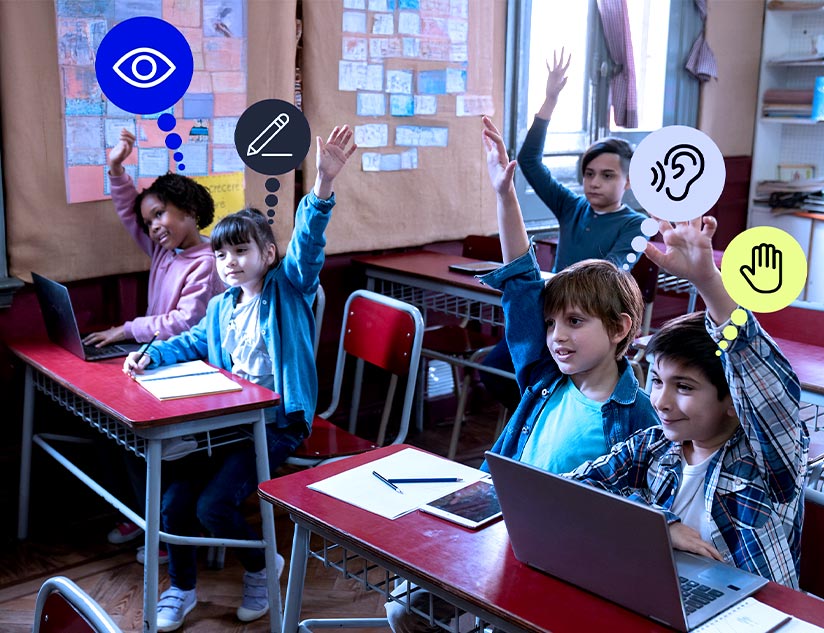This blog was first published on eLearning Industry: https://elearningindustry.com/how-ai-driven-platforms-are-empowering-language-learning
The most significant advantage of learning a new language at any stage of life is that it can improve memory, brain function, concentration, creativity, and communication skills. As the digital age continues to shrink the globe, learning a new language can open diverse opportunities for individuals, introduce learners to disparate cultures, and foster a global culture of harmony.
While technology has reiterated the applicability of learning a new language, it has also facilitated language education. Artificial intelligence (AI) is playing a pivotal role in transforming language learning through enhanced learning experiences. Its share of the global education market is projected to expand at a CAGR of a whopping 36% from 2022 to 2030. Language learning is one of the domains significantly benefitting from evolving AI technology. It is also one of the areas where AI is expected to have the greatest impact.
Personalizing Language Education
The powerful combination of analytical AI and machine learning (ML) is enabling hyper-personalization in education. A study by Stanford University revealed that 80% of the time, AI-powered tools could recommend more accurate help compared to human advice by experts.
Align Content to Student Needs
Advanced technologies help in identifying students’ weak and strong areas. They monitor student growth, learning pace, and learning style preferences to align the content with their needs. The creation of modular content to enable the same is also facilitated with AI-powered content authoring tools. Content reuse and retargeting are simplified with modular content. Thus, AI-powered language learning solutions deliver unique experiences through personalized learning experiences. This was also proven by a study that registered a 62% improvement in adaptive learning test scores.
Equitable Opportunity for All Learners
For slow learners and those with special learning needs, adaptive learning algorithms help recommend ways to enhance the learning material to meet the requirements of specific learner segments. These techniques help accommodate wider learner groups into the language and larger education ecosystem. For self-paced learners, personalized curriculum extensions and revision suggestions can be integrated within the core module, and access can be provided according to individual needs. AI-powered learning assistants can also answer learner queries during hours when teachers are unavailable.
Improving Language Skills
Language learning has four attention areas – reading, writing, listening, and speaking. Students need individualized instruction and assistance to excel in all these areas.
Writing and Listening
Writing and listening can be assessed with the help of NLP-based assessment tools. Instant feedback reduces student anxiety and enables them to understand mistakes while giving them the opportunity to improve performance throughout the course.
Speech and Reading
Voice-recognition systems assess and provide real-time support for improving pronunciation and accent. For languages with multiple dialects, preparing content according to students’ learning goals is simplified with these tools. NLP-powered chatbots can also help students understand the cultural nuances of the language.
Boosting Engagement
Interactive learning is a proven way to boost engagement and retention among students.
Chatbots to the Rescue
Manually assessing the verbal skills of every student can be time-consuming and result in missing out on some errors. Human bias and error are only natural. Language learning chatbots eliminate this problem while helping enhance communicative skills and fluency in the language. They can initiate engaging conversations based on learners’ data to offer relatable experiences. Plus, conversations with chatbots help students shed inhibitions and overcome the fear of judgment.
Experiential Language Education
AI not only facilitates educators, but it also provides full-cycle support for the achievement of learning goals for students. NLP-powered tools use syntactic analysis to assess sentence formation, grammatical correctness, and adequate translation from and to the students’ native languages. Immersive experiences give students a fun way to learn, improving engagement and real-time conversations (which implicitly include feedback) with the chatbots. This ensures the efficacy of learning. They also help students understand subtle cultural nuances of the language.
Redefining the Role of Teachers
With the inclusion of AI in language education, the role of teachers has turned into that of enablers and facilitators of learning. Automated assessments expedite the evaluation of student growth in all segments of language education. This helps teachers reach and address a larger student base. Expedited grading, and automation of administrative tasks, leaves educators with more free time for other responsibilities. Teachers can use the analytical data to improve lesson quality and variety by identifying the performance of various types and parts of the materials.
AI is enhancing learning in the visual, voice, and analytics domains. AI-powered language learning solutions improve the quality of language education, efficiency in achieving learning outcomes, and promote educational equity. For an edtech firm helping language educators, enhancing the learning platform with AI-powered tools can be an industry differentiator.














